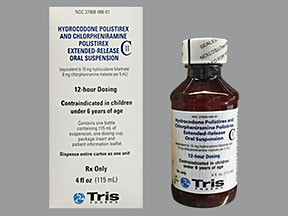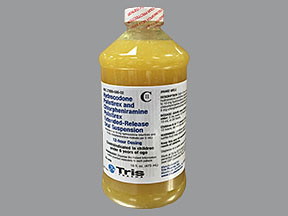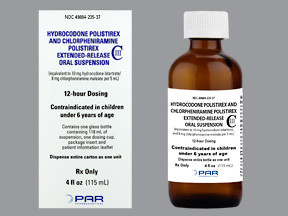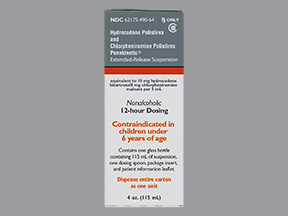HYDROCODONE/CHLORPHENIRAMINE POLISTIREX ER SUSPENSION - ORAL
PHONETIC PRONUNCIATION: (HYE-droe-KOE-done/KLOR-fen-IR-a-meen POL-ee-STYE-rex)
COMMON BRAND NAME(S): Tussionex
GENERIC NAME(S): hydrocodone polistirex/chlorpheniramine polistirex
Uses
USES: This combination product is used to treat coughs and other symptoms caused by the common cold or allergies. This product contains 2 medications: hydrocodone and chlorpheniramine. Hydrocodone is an opioid cough suppressant (antitussive) that acts on a certain part of the brain (cough center) to reduce the urge to cough. Chlorpheniramine is an antihistamine that helps to relieve watery eyes, itchy eyes/nose/throat, runny nose, and sneezing. Do not use this product in children younger than 18 years. There is a risk of serious (rarely fatal) side effects, such as breathing problems. Cough-and-cold products do not cure colds. Cough due to a common cold often does not need to be treated with medicine. Ask your doctor or pharmacist about other ways to relieve cough and cold symptoms, such as drinking enough fluids, using a humidifier, or saline nose drops/spray.
How to use HYDROCODONE/CHLORPHENIRAMINE POLISTIREX ER SUSPENSION - ORAL
HOW TO USE: Read the Medication Guide and, if available, the Patient Information Leaflet provided by your pharmacist before you start taking hydrocodone/chlorpheniramine and each time you get a refill. If you have any questions, ask your doctor or pharmacist. Take this medication by mouth with or without food as directed by your doctor, usually every 12 hours. Do not increase your dose or take this medication more often than every 12 hours or for longer than prescribed. Doing so may increase the risk of serious (possibly fatal) breathing problems. Shake this medication well before each dose. Carefully measure the dose using a special measuring device/spoon. Do not use a household spoon because you may not get the correct dose. Do not mix this medication with other liquids or medications. Doing so can release all of the drug at once, increasing the risk of side effects. This medication may cause withdrawal reactions, especially if it has been used regularly for a long time or in high doses. In such cases, withdrawal symptoms (such as restlessness, watering eyes, runny nose, nausea, sweating, muscle aches) may occur if you suddenly stop using this medication. To prevent withdrawal reactions, your doctor may reduce your dose gradually. Consult your doctor or pharmacist for more details, and report any withdrawal reactions right away. When this medication is used for a long time, it may not work as well. Talk with your doctor if this medication stops working well. Though it helps many people, this medication has a risk for abuse and may sometimes cause addiction. This risk may be higher if you have a substance use disorder (such as overuse of or addiction to drugs/alcohol). Take this medication exactly as prescribed to lower the risk of addiction. Ask your doctor or pharmacist for more details. Tell your doctor if your condition persists or worsens.
Side Effects
Precautions
Interactions
Overdose
Images
Reviews
Faq for HYDROCODONE/CHLORPHENIRAMINE POLISTIREX ER SUSPENSION - ORAL
Hydrocodone/Chlorpheniramine Polistirex ER Suspension is an oral medication that contains hydrocodone, an opioid pain reliever, and chlorpheniramine polistirex, an antihistamine. It is used to relieve cough and symptoms associated with allergies, such as sneezing, itching, and runny nose.
Hydrocodone/Chlorpheniramine Polistirex ER Suspension works by suppressing the cough reflex and reducing allergic reactions. Hydrocodone acts on the brain to decrease the intensity of coughing, while chlorpheniramine blocks the effects of histamine, reducing allergy symptoms.
Common side effects may include drowsiness, dizziness, constipation, dry mouth, blurred vision, and nausea. It is important to follow the prescribed dosage and consult with your doctor if these side effects persist or worsen.
Yes, hydrocodone is an opioid and can be habit-forming if misused or taken in high doses or for prolonged periods. It is important to take this medication only as directed by your doctor and to follow the recommended dosage to avoid addiction.
Patients with a history of allergies to hydrocodone, chlorpheniramine, or any other opioids should not take this medication. It is also not recommended for individuals with respiratory conditions such as asthma, bronchitis, or chronic obstructive pulmonary disease (COPD).
It is important to inform your doctor about all medications you are currently taking, including prescription, over-the-counter, and herbal products. Certain medications, such as sedatives, tranquilizers, and alcohol, may interact with Hydrocodone/Chlorpheniramine Polistirex ER Suspension, potentially causing severe side effects or increased drowsiness.
This medication should be stored at room temperature, away from light and moisture. It should be kept out of reach of children and pets.
Warning
WARNING: Taking hydrocodone/chlorpheniramine with other medications that may also cause drowsiness or breathing problems may increase your risk of very serious side effects, including death. To lower your risk, your doctor should have you take the smallest dose of hydrocodone/chlorpheniramine that works, and take it for the shortest possible time. See also Drug Interactions section. Get medical help right away if any of these very serious side effects occur: slow/shallow breathing, unusual lightheadedness, severe drowsiness/dizziness, difficulty waking up.
Disclaimer
IMPORTANT: HOW TO USE THIS INFORMATION: This is a summary and does NOT have all possible information about this product. This information does not assure that this product is safe, effective, or appropriate for you. This information is not individual medical advice and does not substitute for the advice of your health care professional. Always ask your health care professional for complete information about this product and your specific health needs.







No Reviews Yet